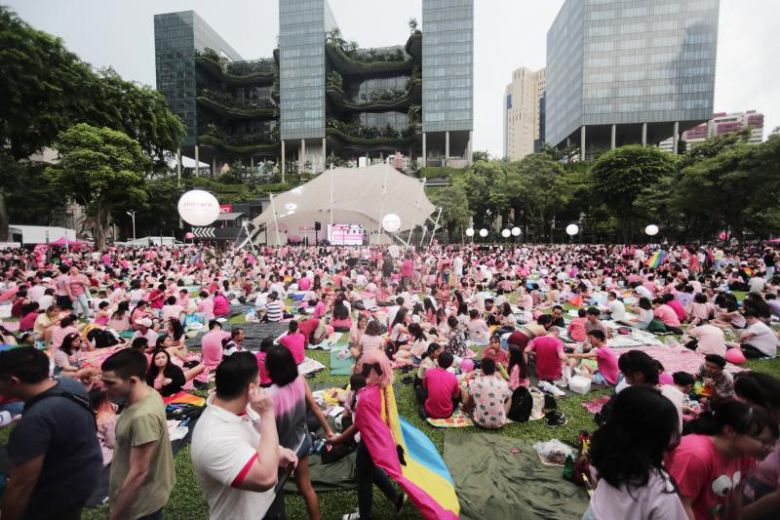Religious reactions on LGBT could cause discomfort
Sign up now: Get ST's newsletters delivered to your inbox

A photo taken on June 29 shows the Pink Dot SG event at Hong Lim Park. Respondents to the IPS study identified religion and LGBT issues as the fault lines most likely to lead to the polarisation of society.
ST PHOTO: KELVIN CHNG
Religious people or leaders speaking up strongly on lesbian, gay, bisexual and transgender (LGBT) issues could cause significant discomfort among Singaporeans, a study on fault lines in Singapore has found.
Some six in 10 respondents said they would be uncomfortable with this scenario.
The respondents also identified religion and LGBT issues as the fault lines most likely to lead to the polarisation of society.
These findings, which were released by the Institute of Policy Studies yesterday, attest to the importance of the Government's policy of separating religion and politics, said the study's authors.
They also highlighted the need for consultative and inclusive policymaking to mitigate polarisation over LGBT issues.
Between 2013 and last year, there were "steep drops" in opposition towards LGBT issues, the study said. But divisions along this fault line are likely to deepen given the role that other social divides like religion, age and education level play in shaping attitudes towards LGBT issues.
Christian respondents were the most likely to be amenable to religious leaders being vocal about LGBT issues. Slightly over half of them said they would be comfortable with it, while the majority of those professing other religions or no religion - between 55 and 71 per cent - said they would feel uncomfortable.
On the potential consequences of managing LGBT issues poorly, younger and more educated respondents were more likely to feel this could result in polarisation and anger against particular communities.
Half of those aged 18 to 25, the youngest cohort surveyed, said polarisation and anger were likely consequences, as did more than half of respondents who held a bachelor's degree and above. Just over a third of those aged above 65, and those with secondary education and below, felt the same way.
This could indicate that LGBT issues were seen as more crucial among younger and more educated respondents, who tended to be more accepting of LGBT rights, the study said.
The divisiveness of LGBT issues also came through in respondents' desired levels of state involvement and public discussion. Younger and more liberal respondents were the most likely to want greater government involvement and more public discussion of LGBT issues.
They might want the Government to ensure equal rights for LGBT people or to repeal Section 377A of the Penal Code which criminalises consensual sex between men, said IPS senior research fellow Mathew Mathews, the study's lead author.
Older respondents and those who said they held neutral or more conservative views were more likely to find current levels of government involvement and public discussion sufficient.
Christians (46 per cent) and Muslims (about 44 per cent) were also more likely to support greater government involvement - but for different reasons.
Adherents of monotheistic faiths are less likely to support LGBT rights, and may want the state to retain Section 377A or curtail the rise of LGBT discourse and events such as the annual pro-LGBT Pink Dot rally, the study said. "They may want the Government to deal with what might be seen as intrusions on the status quo," said Dr Mathews.


